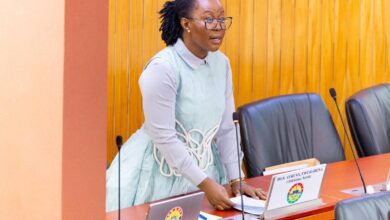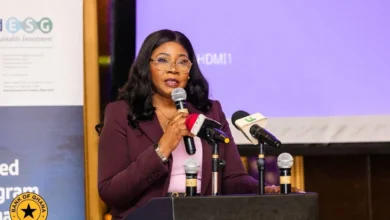Biodiversity loss unchecked threatening foundation of life on Earth – Kofi Don-Agor writes
Biodiversity loss unchecked threatening foundation of life on Earth - Kofi Don-Agor writes

2024 UN Biodiversity Conference from October 21-November 1, 2024
Introduction
The United Nations Biodiversity Conference is crucial as biodiversity loss continues unchecked, threatening the foundation of life on Earth, The event brings together governments, Indigenous leaders, business leaders, and civil society to discuss reversing habitat loss, protecting endangered species, and preserving ecosystems.
The Subsidiary Body Implementation
On the final day of the Subsidiary Body on Implementation (SBI 5), delegates approved two recommendations on national target setting and updating of national biodiversity strategies and action plans, and the pilot forum for voluntary country review with several outstanding issues. COP 16 begins Sunday with an official opening ceremony.
The UN Biodiversity Conference was held from 21 October – 1 November 2024, in Cali, Colombia, preceded by the Subsidiary Body on Implementation (SBI 5) from 16-18 October.
What is Biodiversity
Biodiversity is fundamental to human well-being, a healthy planet, and economic prosperity for all people, including for living well in balance and in harmony with Mother Earth. We depend on it for food, medicine, energy, clean air and water, security from natural disasters as well as recreation and cultural inspiration, and it supports all systems of life on earth.
This statement opens the 2022 Kunming-Montreal Global Biodiversity Framework (GBF). Despite this acknowledgment, however, biodiversity loss continues unabated, threatening the basis of all life on earth. The GBF seeks to reverse this trend by addressing the direct and indirect causes of biodiversity loss and by achieving the three objectives of the Convention on Biological Diversity (CBD): conservation and sustainable use of biodiversity, and fair and equitable sharing of the benefits arising from the use of genetic resources. It guides global biodiversity policy through four overarching goals for 2050 and a set of 2030 targets.
Global Biodiversity Framework
Implementation of the Global Biodiversity Framework (GBF) is facilitated by decisions on resource mobilization, capacity building, and technical and scientific cooperation to address finance and capacity gaps between the developed and the developing world. A monitoring framework, and a decision on mechanisms for planning, monitoring, reporting, and review, are expected to strengthen implementation and compliance. The establishment of a multilateral mechanism for benefit-sharing from the use of Digital Sequence Information (DSI) on genetic resources aims to ensure that the Convention on Biological Diversity (CBD) framework adapts to technological developments.
The Conference Theme
Convening under the theme “Peace with Nature,” the 2024 UN Biodiversity Conference is the first one since the adoption of the Global Biodiversity Framework (GBF). It will include concurrent meetings of the governing bodies of the Convention and its Protocols, including the 16th meeting of the Conference of the Parties to the Convention (COP 16), the eleventh meeting of the Conference of the Parties serving as the Meeting of the Parties to the Cartagena Protocol on Biosafety (CP-MOP 11), and the fifth meeting of the Conference of the Parties serving as the Meeting of the Parties to the Nagoya Protocol on Access to Genetic Resources and the Fair and Equitable Sharing of Benefits arising from their Utilization (NP-MOP 5).
The UN Biodiversity Conference is preceded by the fifth meeting of the Subsidiary Body on Implementation (SBI 5), which will review the preparation of national targets and the alignment of National Biodiversity Strategies and Action Plans (NBSAPs) with the Global Biodiversity Framework (GBF), and will pilot an open-ended forum for voluntary country review.
Review of the Global Biodiversity Framework
At COP 16, participants will review the state of implementation of the GBF, including through alignment of NBSAPs and resource mobilization. Among other items, the meeting is also expected to:
Finalize and operationalize the multilateral mechanism on benefit-sharing from DSI use.
Establish a new programme of work on Article 8(j) and other provisions of the Convention relating to Indigenous Peoples and local communities.
Further, develop the monitoring framework and the global review of the GBF.
Further develop the long-term strategic framework for capacity-building, development, and the mechanism to strengthen technical and scientific cooperation.
Delegates will also address policy, administrative, and financial items, including biodiversity mainstreaming, marine and coastal biodiversity, biodiversity and health, biodiversity and climate change, and synthetic biology.
The Cartagena Protocol on Biosafety (CP-MOP 11) will also consider a range of items related to the implementation of the Cartagena Protocol on Biosafety, including:
the operations and activities of the Biosafety Clearing-House; risk assessment and risk management, including additional voluntary guidance materials to support the case-by-case risk assessment of living modified organisms containing engineered gene drives; and the Nagoya-Kuala Lumpur Supplementary Protocol on Liability and Redress.
The Nagoya Protocol (NP-MOP 5) with further implementation of the Nagoya Protocol on access and benefit-sharing (ABS) by addressing, among other items: the ABS Clearing-House; cooperation with relevant processes; and specialized international ABS instruments. The ABS known as Access and Benefit Sharing is a clearing-house, a key tool for facilitating the implementation of the Nagoya Protocol, by enhancing legal certainty and transparency on procedures for access and benefit-sharing, and for monitoring the utilization of genetic resources along the value chain, including through the internationally recognized institutions, how genetic resources may be accessed, and how users and providers reach agreement on the fair and equitable sharing of the benefits that might result from their use.
Kofi Don-Agor- is a Climate Communicator
President, Climate Communications and Local Governance-Africa




